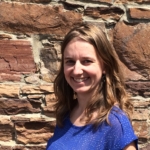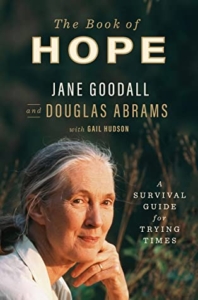
Alexandra Arnold

Contact: almacoachingusa@gmail.co
www.almacoaching.org
Hi, how are you?
Ok. I haven’t left my house in a few weeks because of the smoke from the wildfires.
How tragic. Here, hundreds of people were stranded on the highway for over 24 hours because of the blizzard.
Awful.
Yeah … the weather really has changed over the last few years.
If you live in a culture where greetings start with small talk about the weather, you are likely to have such encounters frequently.
How are you after such an exchange? Is it time to reshape these greetings so they lift us up instead of bringing us down? Do we have the tools to do so? According to Dr. Stowe, co‑director of the Harvard Project on Climate Agreements and executive director of the Harvard Environmental Economics Program, the most important impact individuals can have on climate change is by increasing “climate conversations”. So – let’s talk. But let’s choose our words carefully since, as we know from the Constructionist principle of Appreciative Inquiry, “words create worlds”.
To help, here are just a few of the resources on climate change that I’ve gleaned in the past few months – resources that can move us forward, not leave us stuck. My hope in compiling them into this “gift basket for the planet” is to spark different kinds of dialogues about “how we are”.
Starting with hope
“Hope is what enables us to keep going in the face of adversity. It is what we desire to happen, but we must be prepared to work hard to make it so. Like hoping this will be a good book. But it won’t be if we don’t bloody work at it.” Jane Goodall, The Book of Hope
My journey started last autumn with an email announcement for the Activating Hope Summit celebrating Jane Goodall and her new book, The Book of Hope. The four-day online event aimed at “sparking lasting change by illuminating and celebrating hope around the globe” through a diverse collection of workshops given by celebrities, wellness leaders, musicians, activists and more.
Attending these webinars was overwhelming at first, but then, it really did give me hope. I was struck by the lack of alarmist, guilting and shaming messages. Instead, it was an invitation to soothe the soul. I felt validated. My experience was normalized. I learned techniques to manage stress – and a whole new way to speak about the topic of climate change.
Words, indeed
Sadly, a whole new vocabulary has emerged in the last decade: Climate-anxiety is defined as “a chronic fear of environmental doom” (APA and ecoAmerica, 2017) or “anxiety or worry about climate change and its effects” (www.apa.org/news/podcasts/speaking-of-psychology/eco-anxiety, 2021). Solastalgia is “the distress that is produced by environmental change impacting on people while they are directly connected to their home environment” (Albrecht et al., 2007). Ecological grief is “the mourning of the loss of ecosystems, landscapes, species and ways of life” (Comtesse, Ertl, Hengst, Rosner & Smid, 2021).
There is also something empowering about having these new phrases to use in conversation, especially since most of them are recognized by the American Psychological Association (APA). These complex emotions are not rare diagnoses (to be clear, they are not diagnoses at all). They are more widespread than we think. Now that there are words to talk about them, we can do something about them.
And people…
Indeed, once I started using these terms, I discovered new fields of study and practice that address the range of human experiences triggered by global warming. Ecopsychology, for instance (Division 34 of the APA), explores “humans’ psychological interdependence with the rest of nature and the implications for identity, health and well-being”. The Climate Psychology Alliance, Climate Psychology International and the Climate Psychiatry Alliance all raise awareness of the impact of the climate crisis on mental and physical health.
In one of my “climate conversations”, I learned about climate coaching. As an emerging coach, and someone who experiences climate grief and often wonders “what can I do?”, I was thrilled to find a meaningful way for me to contribute. Since then, I have joined an inspiring community of coaches at the Climate Coaching Alliance (CCA), given a presentation at their Coaching in the Great Awakening global festival on the topic of Climate Anxiety meets Appreciative Inquiry, and started an International Coaching Federation (ICF)-accredited course hosted by Climate Change Coaches. Amazing what one conversation can do!
Put your own oxygen mask on first
Anxiety, fear, grief, despair, hopelessness, powerlessness … no one denies that these are part of the journey. And there is hope. Here are a few more resources to support and nourish ourselves as we take on these critical conversations.
Book Climate Courage: How Americans Are Bridging the Political Divide and Tackling Climate Change – A Bipartisan Citizens Guide by Andreas Karelas. While US-centric, this book can only leave you with a big dose of hope and optimism, no matter where you are in the world. Did you know that solar installer and wind technician will be two of the fastest-growing jobs in the next decade according to the Bureau of Labor Statistics (2021)?
Book The Nature Fix: Why Nature Makes Us Happier, Healthier, and More Creative by Florence Williams. The author’s scientific approach will help fight off any nay-sayer as “she uncovers the powers of the natural world to improve health, promote reflection and innovation, and ultimately strengthen our relationships”.
Podcast – Climate Change and Happiness. As the name of Episode 2 implies, this podcast is for Holding Space. Launched in January 2022 with this provocative title, it is already getting five stars, making listeners feel heard, validated, resilient and hopeful.
Podcast The Jane Goodall Hopecast. Even intrepid world traveler Jane Goodall was slowed down by the pandemic. To our delight, her message is now captured in a podcast series launched in December 2020 where she “reinvented herself as Virtual Jane, and without ever leaving her childhood home in Bournemouth, England, recorded intimate conversations with humans who have dedicated their lives to helping people, animals, and the planet.”
Virtual meeting Climate Café. A safe space with no guest speakers, no lectures and no advice. Free and available once a month.
Virtual meeting Good Grief Network. A ten-step program to personal resilience and empowerment in a chaotic climate. In less than four years, this new program has reached 1000 participants all over the world.
Taking Action Citizens’ Climate International. If action is what you need, CCI “empowers citizen volunteers to exercise personal and political power in the shaping of effective climate policy”.
Taking Action TreeSisters. Still overwhelmed or unsure of what to do next? Plant a tree. Reforestation plays a major role in fighting climate change. TreeSisters is a UK-based charity “in support of humanity’s identity shift from a consumer species to a restorer species. [Their] approach is the balance of inner and outer, spiritual and practical, behavioural and ecological pathways towards that shift.”
There is so much more already happening that can lift us up, give us life, make us smile, and help us do the work required to keep going, with hope.
As we know from AI’s Simultaneity principle, change begins the moment we ask a question. Imagine what would happen if, in our next small talk about the weather, all of us also asked “have you heard of this great [book/podcast/organization/news…]?!” How much can we collectively add to this gift basket for the planet?


